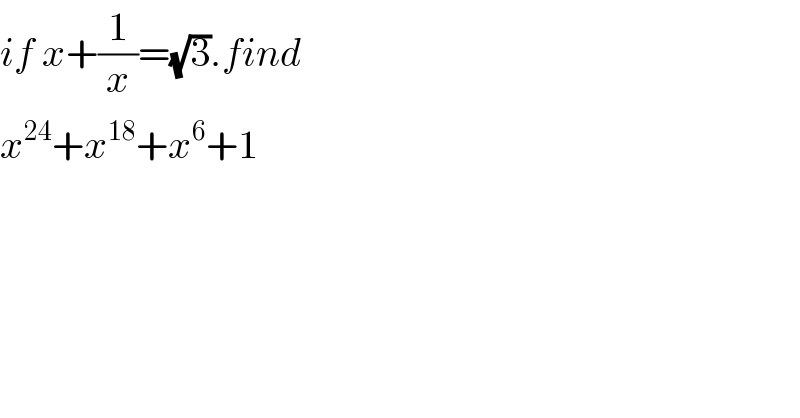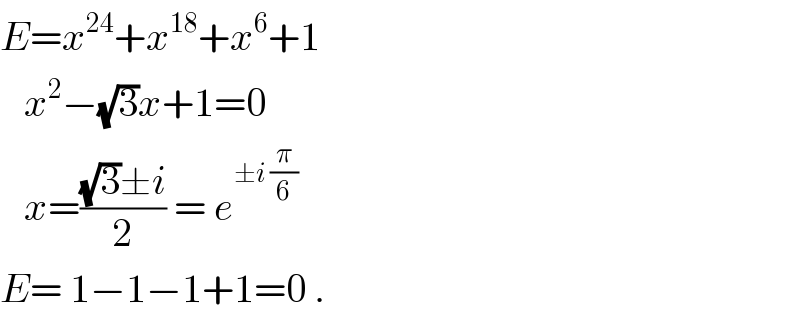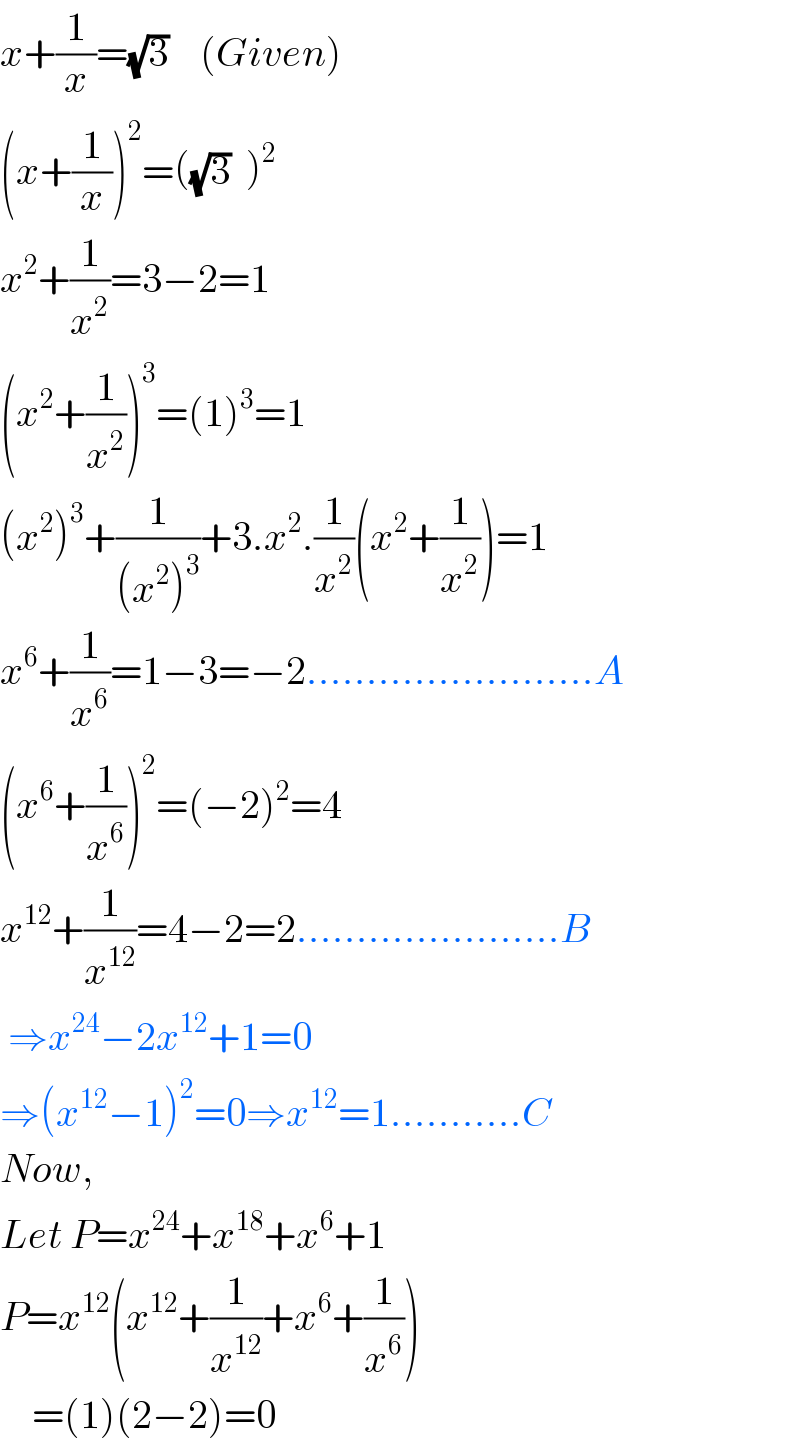
Question Number 60905 by necx1 last updated on 27/May/19

$${if}\:{x}+\frac{\mathrm{1}}{{x}}=\sqrt{\mathrm{3}}.{find} \\ $$$${x}^{\mathrm{24}} +{x}^{\mathrm{18}} +{x}^{\mathrm{6}} +\mathrm{1} \\ $$
Answered by ajfour last updated on 27/May/19

$${E}={x}^{\mathrm{24}} +{x}^{\mathrm{18}} +{x}^{\mathrm{6}} +\mathrm{1} \\ $$$$\:\:\:{x}^{\mathrm{2}} −\sqrt{\mathrm{3}}{x}+\mathrm{1}=\mathrm{0} \\ $$$$\:\:\:{x}=\frac{\sqrt{\mathrm{3}}\pm{i}}{\mathrm{2}}\:=\:{e}^{\pm{i}\:\frac{\pi}{\mathrm{6}}} \\ $$$${E}=\:\mathrm{1}−\mathrm{1}−\mathrm{1}+\mathrm{1}=\mathrm{0}\:. \\ $$
Commented by necx1 last updated on 27/May/19

$${thank}\:{you}\:{sir} \\ $$
Answered by Rasheed.Sindhi last updated on 27/May/19

$${x}+\frac{\mathrm{1}}{{x}}=\sqrt{\mathrm{3}}\:\:\:\:\left({Given}\right) \\ $$$$\left({x}+\frac{\mathrm{1}}{{x}}\right)^{\mathrm{2}} =\left(\sqrt{\mathrm{3}}\:\:\right)^{\mathrm{2}} \:\: \\ $$$${x}^{\mathrm{2}} +\frac{\mathrm{1}}{{x}^{\mathrm{2}} }=\mathrm{3}−\mathrm{2}=\mathrm{1} \\ $$$$\left({x}^{\mathrm{2}} +\frac{\mathrm{1}}{{x}^{\mathrm{2}} }\right)^{\mathrm{3}} =\left(\mathrm{1}\right)^{\mathrm{3}} =\mathrm{1} \\ $$$$\left({x}^{\mathrm{2}} \right)^{\mathrm{3}} +\frac{\mathrm{1}}{\left({x}^{\mathrm{2}} \right)^{\mathrm{3}} }+\mathrm{3}.{x}^{\mathrm{2}} .\frac{\mathrm{1}}{{x}^{\mathrm{2}} }\left({x}^{\mathrm{2}} +\frac{\mathrm{1}}{{x}^{\mathrm{2}} }\right)=\mathrm{1} \\ $$$${x}^{\mathrm{6}} +\frac{\mathrm{1}}{{x}^{\mathrm{6}} }=\mathrm{1}−\mathrm{3}=−\mathrm{2}........................{A} \\ $$$$\left({x}^{\mathrm{6}} +\frac{\mathrm{1}}{{x}^{\mathrm{6}} }\right)^{\mathrm{2}} =\left(−\mathrm{2}\right)^{\mathrm{2}} =\mathrm{4} \\ $$$${x}^{\mathrm{12}} +\frac{\mathrm{1}}{{x}^{\mathrm{12}} }=\mathrm{4}−\mathrm{2}=\mathrm{2}......................{B} \\ $$$$\:\Rightarrow{x}^{\mathrm{24}} −\mathrm{2}{x}^{\mathrm{12}} +\mathrm{1}=\mathrm{0} \\ $$$$\Rightarrow\left({x}^{\mathrm{12}} −\mathrm{1}\right)^{\mathrm{2}} =\mathrm{0}\Rightarrow{x}^{\mathrm{12}} =\mathrm{1}...........{C} \\ $$$${Now}, \\ $$$${Let}\:{P}={x}^{\mathrm{24}} +{x}^{\mathrm{18}} +{x}^{\mathrm{6}} +\mathrm{1} \\ $$$${P}={x}^{\mathrm{12}} \left({x}^{\mathrm{12}} +\frac{\mathrm{1}}{{x}^{\mathrm{12}} }+{x}^{\mathrm{6}} +\frac{\mathrm{1}}{{x}^{\mathrm{6}} }\right) \\ $$$$\:\:\:\:=\left(\mathrm{1}\right)\left(\mathrm{2}−\mathrm{2}\right)=\mathrm{0} \\ $$
Commented by necx1 last updated on 27/May/19

$${too}\:{many}\:{methods}\:{for}\:{approaching}\:{the} \\ $$$${problem}.{I}'{m}\:{so}\:{grateful}. \\ $$
Answered by math1967 last updated on 27/May/19

$${x}+\frac{\mathrm{1}}{{x}}=\sqrt{\mathrm{3}}\:\Rightarrow{x}^{\mathrm{3}} +\frac{\mathrm{1}}{{x}^{\mathrm{3}} }=\mathrm{0}\:\frac{{x}^{\mathrm{6}} +\mathrm{1}}{{x}^{\mathrm{3}} }=\mathrm{0} \\ $$$$\therefore{x}^{\mathrm{6}} +\mathrm{1}=\mathrm{0}\:\:\therefore{x}^{\mathrm{24}} +{x}^{\mathrm{18}} +{x}^{\mathrm{6}} +\mathrm{1}={x}^{\mathrm{18}} \left({x}^{\mathrm{6}} +\mathrm{1}\right)+{x}^{\mathrm{6}} +\mathrm{1} \\ $$$$\:\:\:\:\:\:\:\:\:\:\:\:\:\:\:\:\:\:\:\:\:\:\:\:\:\:\:\:\:\:\:\:\:\:\:\:\:\:\:\:\:={x}^{\mathrm{18}} ×\mathrm{0}+\mathrm{0}=\mathrm{0}{ans} \\ $$
Commented by Rasheed.Sindhi last updated on 27/May/19

$$\mathcal{M}{ore}\:{efficient}\:{approach}\:{than}\:{mine}! \\ $$
Commented by math1967 last updated on 27/May/19

$${Thank}\:{you}\:{sir} \\ $$
